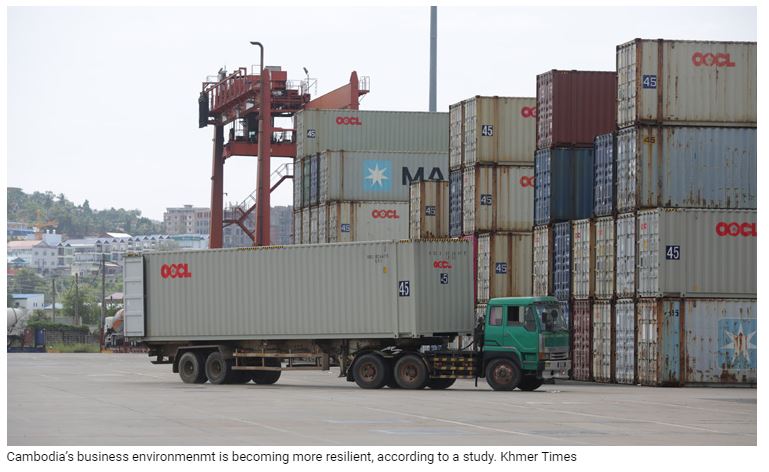Cambodia: Business environment becoming more resilient: Study
With its economy moving forward at a breakneck pace, Cambodia is also becoming more resilient to natural disasters, pandemics, global financial meltdowns and other adverse factors that normally help bring down a country’s business sector.
The newly-released 2020 Global Resilience Index shows that the Kingdom’s ranking has moved up from last year.
This year, Cambodia obtained a total of 28.9 points out of 100, ranking it 112th globally. Last year, the Kingdom earned a measly 21.7 points and was ranked 114th among the 130 countries and territories included in the study.
The study was conducted by FM Global, a leading mutual insurance company in the United States (US).
The study measures the resilience of a country’s economy and business environment based on 12 economic-, risk- and supply-chain-related factors: productivity, political risk, oil intensity, urbanisation rate, exposure to natural hazards, natural hazard risk quality, fire risk quality, inherent cyber risk quality, control of corruption, quality of infrastructure, corporate governance and supply chain visibility.
This resilience is already evident as the Kingdom grapples with the Coronavirus pandemic. Businesses here, except for those in the tourism and related sectors, are striving on despite the adverse effects of the deadly virus.
The study could also be a good indicator how Cambodia’s economy and business sector would fare post COVID-19, a point backed up by Kevin Ingram, executive vice-president and chief financial officer of FM Global.
“Especially after a crisis such as COVID-19, resilience is critical for people, countries and businesses. A country’s ranking in the 2020 FM Global Resilience Index is a good indication of how its business environment will fare and how quickly organisations there might rebound after taking the economic blow of Coronavirus,” he stressed.
“These are critical insights for businesses making far-reaching choices as they build facilities, extend supply chains and cultivate new markets,” he added.
As usual, European countries dominated the rankings.
Norway is ranked as having the most resilient economy in the world. The Scandinavian country scored a perfect 100 points, followed by Switzerland (98.8), Denmark (98.4), Germany (97.5), Sweden (95.4), Finland (95.2), Luxembourg (94.7), Austria (94.6), Central United States (92.9) and Eastern United States (91.6).
On the opposite side are some of the poorest and disaster-prone countries in the world. Haiti obtained zero points to land at the bottom of the list. This is not surprising because the country’s economy and business sectors have been reeling from corruption, mismanagement and natural disasters, including the 2010 earthquake which killed more than 200,000 people and collapsed an already downtrodden economy.
Haiti was followed by Venezuela (8.9 points), Ethiopia (13.8), Chad (19.5) and Lebanon (20.7).
In Southeast Asia, Singapore has the most resilient business environment (22nd in the world with 86.7 points), followed by Malaysia (41st, 66.5), Brunei (49th, 61.1), Thailand (74th, 45.9), Indonesia (80th, 44.1), Vietnam (91st, 40.7), Philippines (94th, 40.3) and Laos (104 th, 31.8). Myanmar was not included in the study.
Source: https://www.khmertimeskh.com/50737968/business-environment-becoming-more-resilient-study/


 English
English




